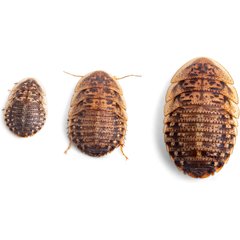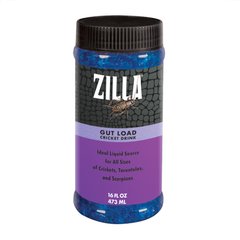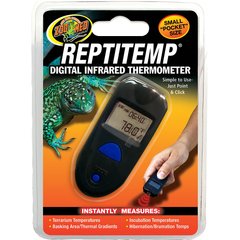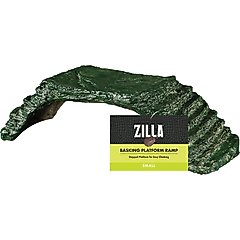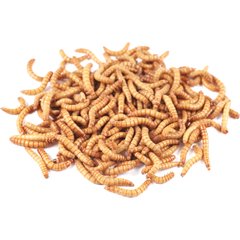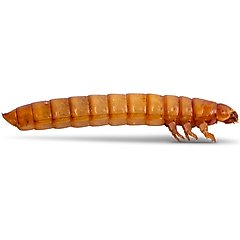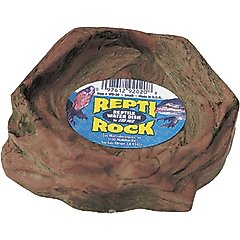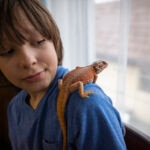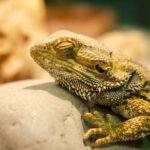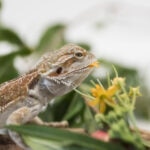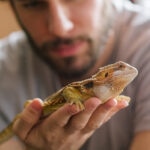How Long Can a Bearded Dragon Go Without Food?
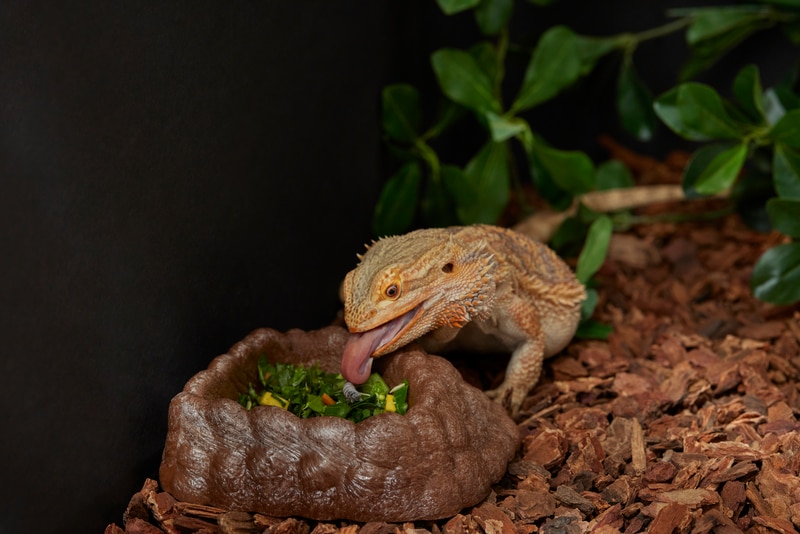
Photo by Chewy Studios
Bearded dragons are hardy reptiles known for their calm temperament and relatively simple care needs. But when your pet bearded dragon suddenly stops eating, it’s natural to worry.
Key Takeaways
- Healthy adult bearded dragons can go up to seven to 10 days without food, but this isn’t ideal.
- Juvenile dragons need to eat regularly, skipping meals for more than a few days can be dangerous to their health.
- Common reasons for appetite loss include stress, illness, impaction, or improper husbandry.
- Work with your vet if you have any concerns related to your beardie’s health.
Understanding how long a bearded dragon can go without food, and why they might stop eating in the first place, can help you respond appropriately and protect your pet’s health.
Typical Eating Habits of a Bearded Dragon
Before we explore how long a bearded dragon can go without food, it’s helpful to understand what normal eating looks like for these reptiles.
Bearded dragons are omnivores, meaning they eat both plants and animals. Their diet typically consists of:
- Gut-loaded insects (e.g., crickets, roaches, mealworms)
- Vegetables (e.g., collard greens, squash, kale, bell peppers)
Recommended Products
Young and juvenile bearded dragons require more protein and eat more frequently, often every day or even multiple times per day. Adult bearded dragons (over 18 months old) eat less frequently, usually every other day or several times a week.
How Long Can a Bearded Dragon Go Without Food?
The answer depends on several factors, including the dragon’s age, health, and environment. Here are general guidelines:
- Healthy adult bearded dragons can go without food for up to seven to 10 days under normal circumstances. Some may survive longer during brumation (a type of reptilian hibernation).
- Juvenile or baby bearded dragons should not go more than a few days without food. They need consistent nutrition to support their rapid growth and development.
- Sick or underweight dragons may experience serious health risks if they skip meals for more than a few days.
While some dragons may survive several weeks without food, this is never ideal. Extended periods without eating may lead to malnutrition, weight loss, and other health problems.
Common Reasons Why Bearded Dragons Stop Eating
If your bearded dragon has stopped eating, identifying the cause is critical. Below are some common reasons a beardie may stop eating.
1. Stress
Bearded dragons can stop eating due to stress from changes in their environment. This may include:
- A new enclosure or relocation
- Introduction of another pet
- Excessive handling
- Improper lighting or temperatures
2. Impaction
Impaction occurs when a dragon swallows a substance (like loose substrate or undigested food) that becomes lodged in the digestive tract. This can cause pain, bloating, and loss of appetite.
3. Illness
Underlying health issues—such as parasites, infections, or metabolic bone disease—can lead to a decrease in appetite. If your dragon is lethargic, has sunken eyes, or shows other signs of illness, contact a reptile vet immediately.
4. Improper Husbandry
When it comes to your beardie’s living conditions, if there are issues with anything involved in their daily care (size of tank, substrate, temperature, cleanliness, etc.), it can impact their health.
For example, bearded dragons need specific temperature and lighting conditions to digest food and maintain overall health. Incorrect temperatures or lack of UVB lighting can disrupt their metabolism and reduce appetite.
5. Brumation
Brumation is a natural, hibernation-like state in reptiles that usually occurs during the cooler months. During brumation, a bearded dragon may sleep for extended periods, become less active, and eat very little or not at all.
However, brumation for captive pet beardies rarely occurs. Lack of eating may be related to a husbandry issue, so it’s best to contact your vet for more guidance.
Signs It’s Time To See a Vet
While some decreases in appetite are temporary and normal (such as during brumation), the following signs warrant a visit to a reptile veterinarian:
- Weight loss or a visibly thin tail and limbs
- Lethargy or unresponsiveness
- Refusal to eat for more than three to four days (especially in juveniles)
- Sunken eyes or dehydration
- Abnormal poop or signs of impaction
What To Do If Your Bearded Dragon Isn’t Eating
Here are some steps to help encourage your dragon to eat:
- Check their environment: Make sure your dragon has the correct temperature gradient (95–105 F in the basking spot and 75 F at the cooler end) and access to UVB lighting.
Recommended Products
- Offer a variety of foods: Try different types of insects and leafy greens in moderation.
Recommended Products
- Reduce stress: Keep their enclosure in a quiet and stable location, and limit handling if they seem anxious.
- Hydrate: Offer water droplets on their snout or give them a warm soak to encourage hydration.
If the appetite loss continues despite these efforts, seek veterinary care.
Can Bearded Dragons Go Without Water Too?
While food is important, hydration is even more critical. A bearded dragon should not go more than a few days without water. Even if they’re not eating, water should always be accessible via a reptile bowl, misting, or soaking.
Recommended Product
While a healthy adult may tolerate up to seven to 10 days without eating (especially during brumation), juveniles and sick dragons require more immediate attention. Always monitor your pet’s behavior and body condition closely. If in doubt, consult a reptile veterinarian.
Proactive care, proper husbandry, and regular checkups are the best ways to ensure your bearded dragon lives a long, healthy life.
Attributions
This article was created with assistance from AI tools. The content has been reviewed for accuracy and edited by a human.
